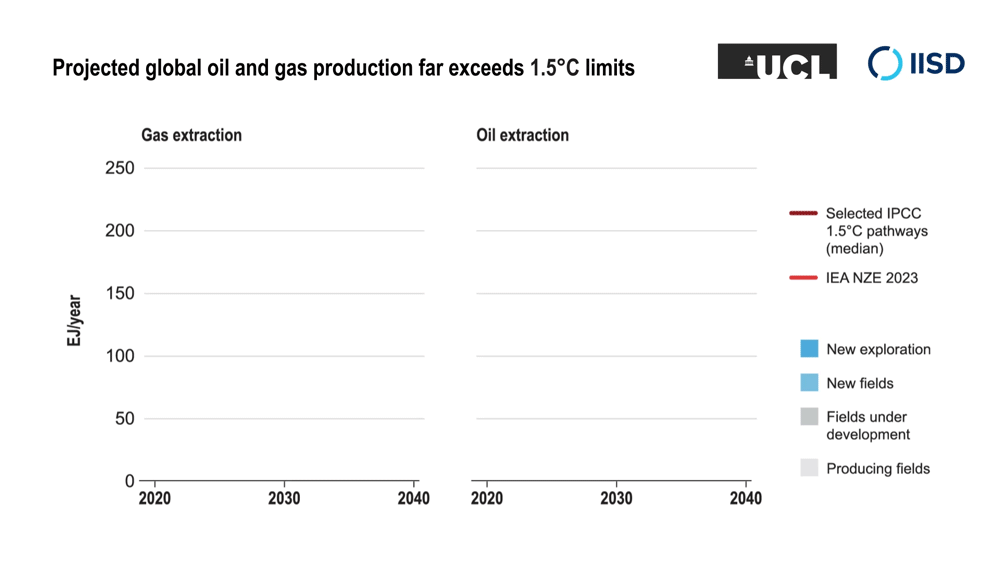No New Fossil Fuel Projects: The logical first step in a transition to clean energy
At the 28th UN Climate Change Conference (COP 28) in Dubai last year, the world’s governments agreed to “transition away from fossil fuels in energy systems, in a just, orderly and equitable manner.” But how can this transition be achieved, when fossil fuels are so embedded in people’s everyday lives, in the global economy, and in powerful political interests?
In an article in the journal Science, a collaboration between IISD and University College London, we propose a viable pathway to phasing out fossil fuels. What we need is a moral norm, a standard of expected behaviour that is progressively applied by governments worldwide. Our analysis argues that this norm should be no new fossil fuel projects.
Our starting point is the scientific evidence on Paris-aligned energy systems. In the first peer-reviewed study to assess new fossil fuel projects under a 1.5°C global warming limit, we confirm and expand the International Energy Agency’s (IEA’s) 2021 finding that no new oil and gas fields are needed on the path to net-zero emissions by 2050.
Fossil fuel and financial interests have suggested that using different scenarios would mean fossil fuel expansion can continue.
In fact, there is nothing radical or unusual about the IEA’s conclusion: there is no room for new fields in any credible 1.5°C-aligned scenario.
Our focus is on scenarios that feature in the Intergovernmental Panel on Climate Change’s Sixth Assessment Report. In a supplement to the Science paper, we examine a full range of 1.5°C scenarios from other researchers. We go further than the IEA by finding that no new coal-fired or gas-fired power plants are needed in 1.5°C scenarios either.

The analysis works by comparing how much energy existing fossil fuel projects can supply—using data from Rystad Energy and from Global Energy Monitor—with how much is consumed in 1.5°C scenarios. We find that production from the existing projects exceeds the Paris-aligned future consumption levels; hence, no new projects are needed.
Then there is the political economy of energy decisions. For the company that proposes it, a new project is one of many investment opportunities to choose between. However, once a project has been built, the company will be incentivized first to recover its sunk investment and then to continue profiting from the project. As long as the product (oil, gas, or electricity) can be sold for more than the marginal cost of producing it, the owner will want to continue running their project. This effect is sometimes called “infrastructure lock-in.”
Similar factors work at the political level. A new project commonly stands to create both winners and losers. At the proposal stage, the losers (for example, people who will be affected by pollution) are usually more able to organize to maintain the status quo. Whereas once it has been built, jobs depend on its continuation, creating a resistance to changing this new status quo.
And from an institutional perspective, it is a sovereign decision whether to grant a permit for a project to be built. But once it has been built, the project owner may have legal entitlements to demand compensation should any policies restrict it, including under international investment treaties.
In these respects, stopping new projects from being built is a much more achievable approach than trying to close existing ones. As the saying goes: when you are in a hole, stop digging.
But how can these lead to limiting emissions at a global level, as is needed to achieve climate goals? Drawing lessons from political science and international relations, we argue that a social-moral norm is a good mechanism for such a policy to spread around the world.
A norm usually starts with proposals from advocates and researchers, and spreads as larger institutions add their weight, and then governments start to adopt it. As they do, the norm gains momentum, placing stronger expectations and pressures on the remaining governments to also follow suit. Evidence from history shows that norm building is especially suited to efforts to end harmful behaviours, such as trading in enslaved people, testing nuclear weapons, or smoking cigarettes.
And some initiatives are already applying the norm-building approach to fossil fuels. The Powering Past Coal Alliance, in which governments commit to phasing out coal power generation, has grown from its 2017 founding by small players to now include major consumers Germany and the United States. Core members of the Beyond Oil and Gas Alliance commit to ending licensing of new oil and gas; again, membership has continued to grow and gain momentum since it was founded in 2021. And the Clean Energy Transition Partnership, also founded in 2021, creates a norm where institutions and governments commit to providing no international public finance for fossil fuels.
By progressively building momentum, norms become self-reinforcing.
Faced with a challenge as large as climate change and the fossil-fuelled economy, it is precisely these kinds of accelerating dynamics that we need to put the COP 28 promise into action.
You might also be interested in
March 2025 | Carbon Minefields Oil and Gas Exploration Monitor
Last month, a total of 22 oil and gas exploration licences were awarded across six countries, with an estimated volume of discovered resources of 45.4 million barrels of oil and 10.4 billion cubic feet of gas.
February 2025 | Carbon Minefields Oil and Gas Exploration Monitor
In January 2025, 77 oil and gas exploration licences were awarded in seven different countries, with Norway leading in terms of embodied emissions.
January 2025 | Carbon Minefields Oil and Gas Exploration Monitor
Last month, a total of 78 oil and gas exploration licences were awarded in two countries. The United States had the largest volume of embodied emissions in the licences it awarded.
December 2024 | Carbon Minefields Oil and Gas Exploration Monitor
In November 2024, 23 oil and gas exploration licences were awarded across five countries, with Russia granting the licences that account for the largest portion of embodied emissions.
